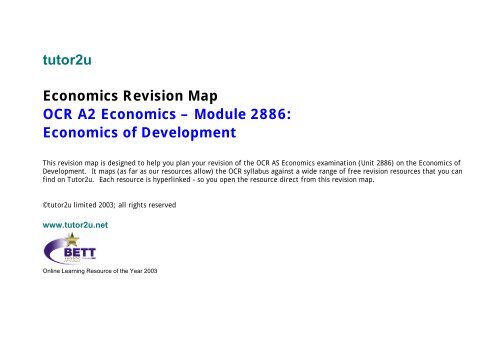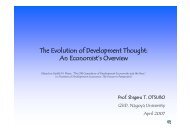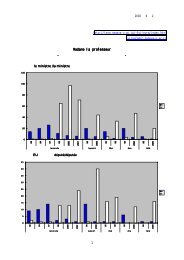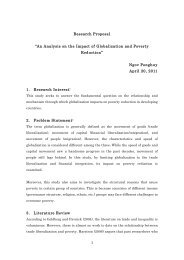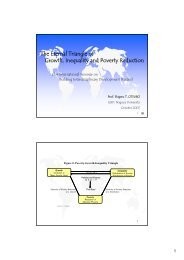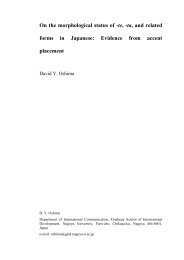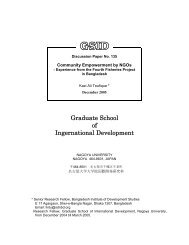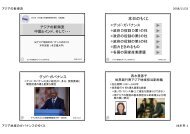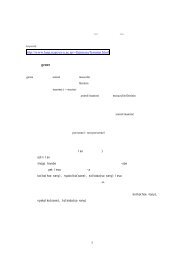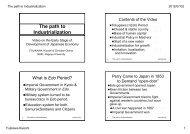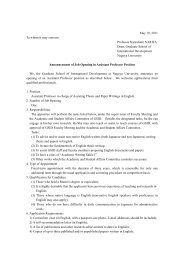tutor2u Economics Revision Map OCR A2 Economics – Module ...
tutor2u Economics Revision Map OCR A2 Economics – Module ...
tutor2u Economics Revision Map OCR A2 Economics – Module ...
Create successful ePaper yourself
Turn your PDF publications into a flip-book with our unique Google optimized e-Paper software.
<strong>tutor2u</strong><br />
<strong>Economics</strong> <strong>Revision</strong> <strong>Map</strong><br />
<strong>OCR</strong> <strong>A2</strong> <strong>Economics</strong> <strong>–</strong> <strong>Module</strong> 2886:<br />
<strong>Economics</strong> of Development<br />
This revision map is designed to help you plan your revision of the <strong>OCR</strong> AS <strong>Economics</strong> examination (Unit 2886) on the <strong>Economics</strong> of<br />
Development. It maps (as far as our resources allow) the <strong>OCR</strong> syllabus against a wide range of free revision resources that you can<br />
find on Tutor2u. Each resource is hyperlinked <strong>–</strong> so you open the resource direct from this revision map.<br />
©<strong>tutor2u</strong> limited 2003; all rights reserved<br />
www.<strong>tutor2u</strong>.net<br />
Online Learning Resource of the Year 2003
HOW TO USE THIS REVISION MAP<br />
This revision map provides links to a selection of free resources on <strong>tutor2u</strong> for students taking the <strong>OCR</strong> AS Unit 2886 examination.<br />
The map is not intended to provide a complete list of all the revision you should do before the exam. But hopefully it will provide some<br />
useful materials that will help supplement your teacher’s resources and other materials you are using for revision.<br />
We recommend highlighting or marking each resource once you have visited the site.<br />
We also recommend trying the interactive quizzes fairly often during your revision <strong>–</strong> so that you can track your progress. There are<br />
over 1,000 AS standard questions for <strong>Economics</strong> students alone on <strong>tutor2u</strong> <strong>–</strong> plenty to keep you tested!<br />
Please note, you will need a recent version of your favourite internet browser (we recommend Internet Explorer) to get full benefit from<br />
the interactive quizzes.<br />
Please send feedback about this revision map to Jim Riley at jimriley@<strong>tutor2u</strong>.net so that we can develop the resource for future<br />
students.<br />
Best wishes and GOOD LUCK from everyone at Tutor2u
TABLE OF CONTENTS<br />
1 The Concept of Development........................................................................................................................................................................................................4<br />
2 Economies at Different Stages of Development ...........................................................................................................................................................................5<br />
3 Theories and Models Linked to Development...............................................................................................................................................................................6<br />
4 Problems of Developing Economies .............................................................................................................................................................................................7<br />
5 Policies to promote development ..................................................................................................................................................................................................8
Tick When<br />
Covered <strong>Revision</strong> Notes Presentations Interactive Quizzes<br />
1 THE CONCEPT OF DEVELOPMENT<br />
Candidates should be able to:<br />
• Define development in terms of material and non-material progress<br />
• Distinguish between development and growth<br />
• Understand the limitations of national income statistics in measuring development<br />
• Understand the HDI and how it improves on national income statistics<br />
Content of the Syllabus:<br />
- The meaning and definition of development. Growth and development<br />
- Measurement: the limitations of national income statistics and the use of the Human Development Index<br />
- The range of terms used to identify economies at different stages of development: developing and developed. Sub-division of developing economies to include<br />
low and middle income countries<br />
- Transition economies, and newly industrialised countries<br />
- Differentiated development within developed economies<br />
Introduction to Development <strong>Economics</strong><br />
<strong>Economics</strong> of Development<br />
Measuring Development<br />
Less Developed Countries
Tick When<br />
Covered <strong>Revision</strong> Notes Presentations Interactive Quizzes<br />
2 ECONOMIES AT DIFFERENT STAGES OF DEVELOPMENT<br />
Candidates should be able to:<br />
• Understand how the sectors in an economy can be identified and classified;<br />
• Apply these classifications to different types of developing country and to different regions within more developed countries;<br />
• Understand the economic, cultural, political and social influences that have determined an economy’s level of development;<br />
• Analyse how these influences have had impacts on different economies and regions.<br />
Content of the Syllabus:<br />
- The characteristics of different types of developing economy. Similarities and differences between them<br />
- The sectors of an economy: primary, secondary, tertiary and quaternary, formal and informal, rural and urban, traditional and modern<br />
- The economic, political and social influences on development and their occurrence in different types of developing economy: culture, system of government,<br />
colonial background, economic system<br />
Types of Economic Sector<br />
Categorising Countries<br />
Objectives of Economic Development<br />
Market Approaches to Development<br />
State Approaches to Development<br />
Finance, Debt and Terms of Trade<br />
Social Capital and Cohesion
Tick When<br />
Covered <strong>Revision</strong> Notes Presentations Interactive Quizzes<br />
3 THEORIES AND MODELS LINKED TO DEVELOPMENT<br />
Candidates should be able to:<br />
• Explain the difference between absolute and comparative advantage<br />
• Evaluate how external trade can promote economic development and growth<br />
• Understand the assumptions and predictions of the theories and models of economic development and growth<br />
• Understand the limitations of the theories and models<br />
• Apply the theories and models to actual cases<br />
• Discuss their usefulness in the understanding of the process and problems of development<br />
Content of the Syllabus:<br />
- The content and limitations of models and theories linked with development<br />
- Absolute and comparative advantage - the basis for trade, gains from trade and the role of trade in development<br />
- Rostow’s model - the stages of growth<br />
- The Harrod-Domar model - the role of saving and investment<br />
- Lewis’ model - the role of structural change<br />
- Dependency theory <strong>–</strong> relationships and links between developed and developing economies and regions<br />
- Balanced and unbalanced growth theory - the approach to industrialisation<br />
Introduction to Models of Development<br />
Balanced Growth Theory<br />
Comparative Advantage Theory<br />
Dependency Theory<br />
Harrod-Domar Model<br />
Lewis Model<br />
Rostow Model<br />
Unbalanced Growth Model
Tick When<br />
Covered <strong>Revision</strong> Notes Presentations Interactive Quizzes<br />
4 PROBLEMS OF DEVELOPING ECONOMIES<br />
Candidates should be able to:<br />
• Understand the problems faced by developing economies<br />
• Analyse the causes of the problems faced by developing economies<br />
• Analyse the implications of these problems for future development<br />
• Distinguish between problems arising from within the economy and those relating to external factors<br />
• Discuss the relative importance of the different problems<br />
• Discuss the links between domestic and international problems<br />
• Evaluate the extent to which developing economies have similar underlying problems<br />
Content of the Syllabus:<br />
- The causes and the implications of the problems faced by developing economies<br />
- Domestic problems: environment and sustainability, factor endowment, population change and migration, poverty and inequality, savings rates and capital<br />
accumulation, structural change, unemployment and underemployment, weaknesses of financial markets, price instability, and government failure<br />
- International problems: patterns of trade, balance of payments, dependency, foreign debt, terms of trade, international capital flows, exchange rate fluctuations<br />
- The impact of globalisation and the activities of multi-national companies<br />
- Similarities and differences between different types of developing economy<br />
Export and Import Penetration<br />
Foreign Aid<br />
Globalisation<br />
Population and Migration<br />
Structural Issues and Unemployment<br />
Sustainability
Tick When<br />
Covered <strong>Revision</strong> Notes Presentations Interactive Quizzes<br />
5 POLICIES TO PROMOTE DEVELOPMENT<br />
Candidates should be able to:<br />
• Understand the role of domestic and international institutions in tackling problems of development<br />
• Discuss their relative importance and success<br />
• Analyse the effectiveness of market and state approaches to promoting development<br />
• Understand the scope of domestic and international policies to promote development<br />
• Explain how such policies seek to address the problems of developing countries<br />
• Assess the effectiveness and limitations of these policies<br />
Content of the Syllabus:<br />
- The operation and limitations of policies to promote development. The role of governments, non-government organisations, the IMF, World Bank and World<br />
Trade Organisation. Their contribution and effectiveness in the promotion of development<br />
- The alternative approaches to economic development through the free market and state planning<br />
- Domestic policies: resource improvement and management, promotion of sectoral change, industrialisation, population control, structural adjustment<br />
programmes, macro-economic stabilisation<br />
- International policies including those of the European Union: export promotion and import substitution, foreign debt management, foreign aid, foreign direct<br />
investment, trade agreements and trade liberalisation, currency stabilisation<br />
Government Policy and Development<br />
International Monetary Fund<br />
Multinationals<br />
World Bank<br />
World Trade Organisation


